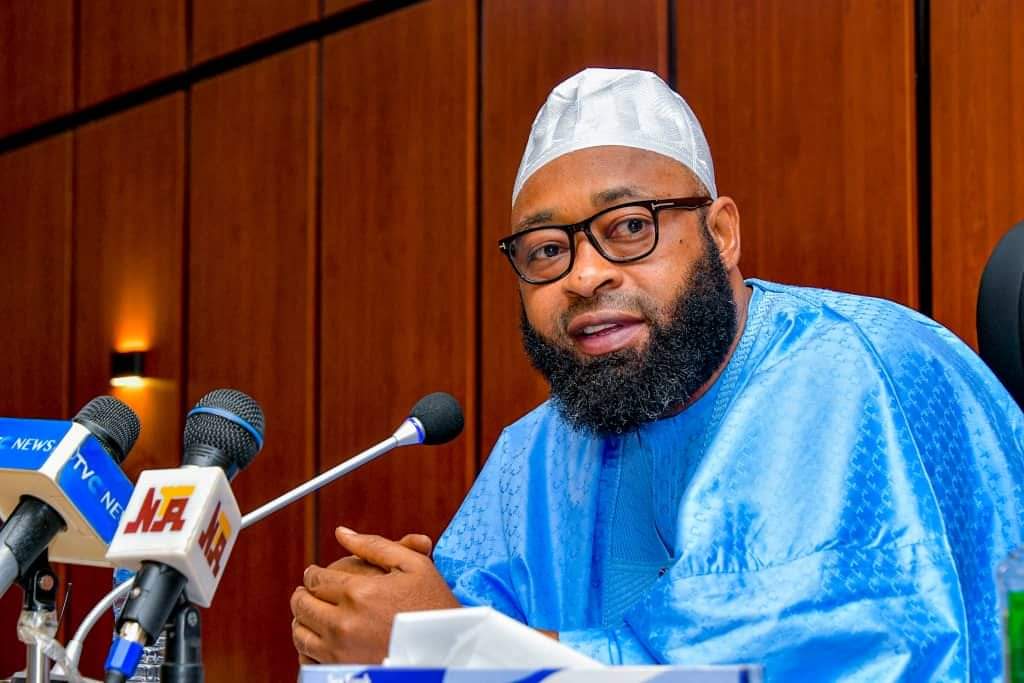Economy
eNaira and Emefiele’s many reforms, by Khalifa Mahmood

The recent launch of the Central Bank Digital Currency (eNaira) didn’t come to many Nigerians who have been following the unparalleled feats of the Central Bank Governor, Chief Godwin Emefiele, with keen attention as a surprise.
By this singular feat of Emefiele’s CBN, Nigeria has become the first country in Africa, and one of the first in the world to introduce a digital currency to its citizens. This is no small achievement, particularly as the country, like other parts of the world, is coming out of COVID-19 induced recession.
This breakthrough, like many others before it in Nigeria’s financial ecosystem, is a block chain technology that will add a whopping $2.9 trillion (N1.189 trillion) every year to the country’s Gross Domestic Product (GDP).
What this simply means is that: the country’s GDP will be raised by $29 billion in the next 10 years. This was aptly captured by President Muhammadu Buhari during the launch of the national digital currency midwifed by Emefiele’s CBN.
“Alongside digital innovations, CBDCs can foster economic growth through better economic activities. Indeed, some estimates indicate that the adoption of CBDC and its underlying technology, called block chain, can increase Nigeria’s GDP by US$29billion over the next 10 years,” the president proudly announced.
The eNaira, will among others, help increase remittances, foster cross border trade, improve financial inclusion, make Monetary Policy more effective, and enable the government to send direct payments to citizens eligible for specific welfare programmes.
At the launching, the CBN governor also unveiled a new financial instrument christened “The 100 for 100 PPP – Policy on Production and Productivity” to reduce the nation’s overdependence on imports.
He said the instrument “will be anchored in our Development Finance Department under my direct supervision.”
“Under this policy, the CBN will advertise, screen, scrutinize and financially support 100 targeted private sector companies in 100 days, beginning from 01 November 2021, and rolling over every 100 days with a new set of 100 companies, whose names will be published in National Dailies for Nigerians to verify and confirm.
“The purpose of this instrument is to take further steps to reverse our over reliance on imports,” the CBN governor said.
Chief Emefiele said working through banks, the financial instrument would be available to their customers in critical areas to boost the production and productivity, with a view to immediately transforming and jumpstarting the productive base of the economy.
“After these 100 projects by companies in the first 100 days from November 1, we will take the next 100 companies/projects for another 100 days beginning February 1, 2022, and then another 100 companies for another 100 days beginning from May 1, 2022.
“We believe that if we target and support the right companies and projects, we will see a significant, 14 measurable and verifiable increase in local production and productivity, reduction in certain imports, increase in non-oil exports, and improvements in the FX-generating capacity of the economy.
“This, in my view, is the best and most sustainable way to address the Naira’s value –whether in hard currency or digital eNaira – through production, production and more production,” Chief Emefiele explained.
Financial analysts and economists have, for years, realized the tremendous reforms the CBN governor brought to the country’s financial and economic sectors through various programmes and policies, with eNaira being the latest.
In an attempt to save the naira, for instance, the CBN has issued at least 21 policies and directives between September 2020 and September 2021.
In August 2020, Emefiele resolved to go tough on exporters who were guilty of forex non-repatriation. This was another effort to tackle the prevalent forex crisis in the country by increasing forex liquidity. The CBN ordered banks to submit the names, addresses, and Bank Verification Numbers (BVNs) of all the exporters who had failed to repatriate their export proceeds, for necessary ‘action’.
When faced with rising cases of forex hoarding and funding of militant and terrorist groups, Emefiele swooped to action by taking deliberate and albeit drastic policies in arresting those maladies with catastrophic effects on the security architecture of the country.
After the CBN’s monetary policy rate (MPR) meeting in July 2021,Chief Emefiele braved the odds and banned Bureau De Change (BDC) operators from accessing forex, and also said some them have become conduit for illegal financial flows working with corrupt people to conduct money laundering in Nigeria.
“They have turned themselves away from their objectives. They are now agents that facilitate graft and corruption in the country. We cannot continue with the bad practices that are happening at the BDC market,” the CBN chief said.
He said the depreciating value of the national currency was partly because of prevailing ownership of several BDCs by the same promoters to procure multiple forex from the central bank.
“Several international organizations, embassies patronise BDC through illegal forex dealers to fund their institutions. We will deal ruthlessly with Nigerian Banks that deal with illegal BDCs and we will report foreign organisations patronising them,” he said.
It is a truism that not all BDC operators are engaged in subterranean operations in their course of doing their businesses. But the fact remains that some enemies of Nigeria are using the unofficial forex windows to perpetrate crimes against the country.
The apex bank, as part of the operation, traced and blocked billions of naira to businesses belonging to persons in banks in a series of ‘post no debit letters.
The CBN governor did not stop there. Despite the political repercussions, the CBN in March 2021, froze 193 corporate and individual bank accounts over allegations of suspicious forex transactions. This was done after 138 accounts were frozen earlier in February.
Not done yet, in April 2021, the CBN investigated and engineered the arrest and arraignment of over 400 persons across the country in an ongoing nationwide crackdown on financiers of Boko Haram and other criminal groups in Nigeria.
All these are Emefiele’s continuous efforts in tackling terrorism and terrorist financing across the country. This alone will hasten the defeat of terrorists as they are starved of funds, hardware, food, weapons and everything.
While working tirelessly to ensure physical security, the CBN under Emefiele is equally bent on reducing unemployment, particularly among the youths.
Just recently, the CBN developed the Tertiary Institutions Entrepreneurship Scheme (TIES), in partnership with Nigerian polytechnics and universities to harness the potential of graduate entrepreneurs (gradpreneurs) in the country.
The goal of the TIES is to enhance access to finance to undergraduates and graduates of polytechnics and universities in Nigeria with innovative entrepreneurial and technological ideas.
Under this policy, the CBN will offer N500 million grant to graduates, undergraduates with the best entrepreneurship pitch across the tertiary institutions.
Emefiele’s revolution has touched not only those at the fiscal sectors, but even the peasant farmers at the downtrodden ladder. Despite the coronavirus pandemic that precipitated global lockdown, Nigeria didn’t suffer food shortage. This is thanks to Emefiele’s agro-economic intervention.
The CBN governor principally achieved this through the Anchor Borrowers Programme(ABP) launched by President Buhari in 2014.
It is public knowledge that the ABP has empowered rice farmers and processors in the country and resulted in a significant boost in rice production in the country. Official data shows that the ABP has added six million metric tons of rice supply in the country annually and created nearly six million direct jobs in a year.
Official statistics from the Rice Farmers Association of Nigeria (RIFAN) reveals that about two million direct jobs are created every cropping season. And Nigeria has three cropping seasons in a year, all of them fully funded by the CBN. These jobs are restricted to only the production value chain of rice, and not include millions of other jobs created in the processing, packaging, transport, marketing sectors of the rice ecosystem.
Courtesy Emefiele’s reforms, over 100 integrated rice millers are currently working across the country, providing thousands direct and indirect jobs. This Is not to mention over 50 fertilizer plants, hiring thousands and counting.
The ABP has so far saved Nigeria over N369 billion per annum, while the country consumes N1.5 billion worth of rice every day. This breakthrough has saved the country the challenge of sourcing forex or devaluing our currency to finance this monstrous import wage bill.
There is no gainsaying repeating the fact that Emefiele is playing a crucially unprecedented role that is shaping almost all the spheres of our human lives, irrespective of our economic status and whether we live in cities or in villages.
Mahmood writes from Katsina
Economy
Bago inaugurates empowerment programme for 716 youths in Niger

Gov. Umaru Bago of Niger State has inaugurated an empowerment programme for 716 youths sponsored by a state lawmaker, Alhaji Sani Umar (APC-Kontagora 1), in Kontagora Local Government Area of the state.
While inaugurating the programme that involved disbursement of funds on Sunday in Kontagora, he said it would enable youths to acquire skills for self-reliance.
Bago, represented by his deputy, Mr Yakubu Garba, commended the lawmaker for the empowerment programme, which he described as people-centred.
He urged the beneficiaries to make good use of the support given to them, saying that the programme was designed to have a positive impact on their lives.
He said that the state government would continue to come up with policies th positive impact on the lives of the people, especially women and youths.
Bago said that youth empowerment was crucial to fighting unemployment, restiveness and hardship.
He commended the state legislators for their support and collaboration, attributing the government’s successes to their continued assistance and foresight.
The governor reiterated his resolve to foster cohesion between the executive and legislature, ensuring the delivery of democracy dividends to the electorate.
In his remarks, Alhaji Abdulmalik Sarkindaji, Speaker of the House of Assembly, commended the lawmaker for the initiative aimed at empowering the youths to become self-reliant.
He lauded the governor for not interfering with legislative engagements, and for promoting democratic principles in governance and the polity.
Earlier in his address, Umar, the sponsor of the programme, said the empowerment was aimed at reducing unemployment and restiveness among youths in his constituency.
He thanked the governor for his support and encouragement for the programme.
Also speaking, Alhaji Aminu Bobi, Chairman of the All Progressives Congress (APC) in Niger, thanked the governor for his support and administrative prowess, which he said had brought significant changes to the state.
One of the beneficiaries, Aisha Mohammed, thanked the lawmaker for the gesture and promised to make judicious use of the funds to better her life.
The News Agency of Nigeria (NAN) reports that the event was attended by top government officials, traditional rulers, and other stakeholders in the stat
Economy
Benue at 49: Governor Alia’s Vision for Economic Prosperity and Infrastructure Growth

As Benue State celebrates its 49th anniversary, Governor Hyacinth Alia has emphasized his commitment to driving the state to unprecedented levels of economic prosperity and infrastructural development.
In a statement signed by his Chief Press Secretary, Mr. Tersoo Kula, and made available to newsmen on Monday in Makurdi, Alia outlined the significant reforms his administration has set in motion since he assumed office.
“Less than two years into our administration, we have achieved remarkable breakthroughs, unprecedented in the history of the state,” said Alia.
The governor highlighted key achievements, including the rollout of programs aimed at boosting agricultural productivity and agribusiness to ensure food security and improve livelihoods. “We have rehabilitated roads, opened new ones, constructed and fixed public facilities to make Benue more accessible, enhancing economic growth,” he stated.
Alia also underscored the administration’s focus on healthcare, pledging to advance healthcare facilities to ensure quality and accessible services for all citizens. “Our resolve is to take the state where every citizen experiences prosperity, security, and opportunity,” he added.
The governor stressed that achieving these goals requires the collective efforts of all Benue citizens. “This target cannot be achieved alone. It calls for the collaborative determination of all stakeholders, community leaders, traditional rulers, business owners, and our energetic youth. Together, the administration can build a future that mirrors our joint desires,” Alia urged.
As the state marks its 49th anniversary, the governor called on the people to remain steadfast in their commitment to promoting Benue’s growth. “I extend a hand of fellowship to all stakeholders to join hands with us in this noble endeavour,” he concluded.
Economy
NCS Records Historic ₦6.1 Trillion Revenue in 2024

The Nigeria Customs Service (NCS) has achieved a historic milestone, collecting a record ₦6.1 trillion in revenue in 2024, surpassing its ₦5.1 trillion target by ₦1.03 trillion. This represents a 20.2% increase above the target and an impressive 90.4% rise from the ₦3.2 trillion collected in 2023.
Speaking at a press briefing in Abuja on January 14, 2025, the Comptroller-General of Customs, Bashir Adewale Adeniyi, attributed the remarkable performance to strategic reforms, enhanced operational efficiency, and strong alignment with government policy objectives. “This growth is historic as it marks the highest year-on-year increase recorded by the Service in recent times,” he noted.
The record-breaking revenue is segmented into ₦3.66 trillion for the Federation Account, ₦816.9 billion for Non-Federation Account Levies, and ₦1.63 trillion in Value Added Tax (VAT) on imports.
Adeniyi highlighted the Service’s effort to balance revenue collection with trade facilitation, granting concessions worth ₦1.68 trillion to stimulate industrial growth while tightening controls to prevent abuses.
The Service also achieved remarkable progress in trade facilitation, recording a 179.3% increase in total trade value to ₦196.94 trillion in 2024, compared to ₦70.5 trillion in 2023. This growth was driven by a surge in the export trade, which saw a 219.5% increase in value to ₦136.65 trillion.
Significant advancements were made in customs operations, including the introduction of the Advanced Ruling System and the Authorized Economic Operator (AEO) programme. The latter has reduced cargo clearance times to an average of 43 hours for AEO-certified companies. Additionally, the indigenously developed digital clearance platform, “B’Odogwu,” generated ₦31 billion in revenue during its pilot phase.
In 2024, the NCS received international acclaim, advancing 33 places in the Presidential Enabling Business Environment Council (PEBEC) rankings and being recognised among the top five agencies for trade facilitation. Strategic partnerships, such as with the Healthcare Federation of Nigeria, have streamlined the clearance of medical supplies, aligning with the federal government’s health accessibility goals.
The Service’s trade facilitation efforts under the African Continental Free Trade Agreement (AfCFTA) have also bolstered the participation of Nigerian exporters in global markets, with notable representation at the Biashara Afrika forum in Kigali.
Adeniyi attributed these achievements to the support of President Bola Ahmed Tinubu’s administration and the dedication of NCS officers. He reaffirmed the Service’s commitment to leveraging technology, fostering stakeholder collaboration, and enhancing operational efficiency to sustain growth.
-

 Headlines4 years ago
Headlines4 years agoFacebook, Instagram Temporarily Allow Posts on Ukraine War Calling for Violence Against Invading Russians or Putin’s Death
-

 Headlines4 years ago
Headlines4 years agoNigeria, Other West African Countries Facing Worst Food Crisis in 10 Years, Aid Groups Say
-

 Foreign4 years ago
Foreign4 years agoNew York Consulate installs machines for 10-year passport
-

 News1 year ago
News1 year agoZero Trust Architecture in a Remote World: Securing the New Normal
-

 Entertainment3 years ago
Entertainment3 years agoPhyna emerges winner of Big Brother Naija Season 7
-

 Headlines2 years ago
Headlines2 years agoNigeria Customs modernisation project to check extortion of traders
-

 Entertainment2 years ago
Entertainment2 years agoMovie download platform, Netnaija, announces closure
-

 Economy2 years ago
Economy2 years agoWe generated N30.2 bn revenue in three months – Kano NCS Comptroller







